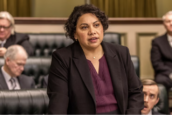
Leaders highlight ecumenical challenges
Five general secretaries of international ecumenical organisations engaged in lively conversation with leaders of the Evangelical Church in Germany (EKD) on April 8, the final day of the EKD Council’s visit to the Ecumenical Centre in Geneva.
“One of the most pressing challenges we face is religious intolerance,” said John Nduna of ACT Alliance, a coalition of churches and church-related agencies working in human development and emergency assistance.
As a second concern, Mr Nduna cited “the shrinking humanitarian space around the world, hindering how we can reach people in need of aid”. Partnership among service providers is of key importance, both in promoting dialogue with governments and in advocating before international organisations tasked with improving conditions in troubled locations, he said, according to a report from the World Council of Churches (WCC).
In Darfur, he continued, “we have had excellent results in working with Caritas,” the Roman Catholic global service ministry. “We are asking how we can replicate that in other regions, in interfaith as well as ecumenical cooperation,” Mr Nduna said.
“We cannot be ecumenical on our own,” agreed the Rev. Martin Junge of the Lutheran World Federation. It is necessary to overcome mutual suspicions not only among churches or traditions within Christianity, but also among ecumenical organisations that may seem to be in competition with one another, he said.
The Rev. Olav Fykse Tveit of the WCC said a commitment to mutual support should accompany an expectation of “mutual accountability” in encounters among churches, agencies, states and cultures. Such partners need to strive for a sense of “unity that has substance,” he said, and to seek new models of dialogue and cooperation that will “bring all sorts of actors together”.
The Rev. Setri Nyomi of the World Communion of Reformed Churches thanked the representatives of the EKD for their active involvement in ecumenical work “both in the German context and in the world context.”
He saw two principal concerns driving the programme of Reformed churches in coming years: Continued dedication to “fostering the visible unity of the church”, and “addressing the many injustices that are experienced not only in the global South but by people everywhere”.
Prof. Viorel Ionita of the Conference of European Churches (CEC) noted that European churches face specific issues arising from the secularisation of nations and a continent that once were deemed Christian. Through dialogue among the churches, CEC finds common ground with the Roman Catholic Church as well as among its own members.
Ecumenical bodies like the CEC exist to support churches in their vocation today, to participate with them in bearing the gospel of Jesus Christ within sometimes hostile societies and to advocate on behalf of churches and their members before European political institutions. “In all of this,” he concluded, “the EKD joins in playing an important role in Germany, in Europe and throughout the world.”
Bishop Martin Schindehutte, who is responsible for the EKD office of foreign affairs and ecumenical relations, observed that “We need each other’s insights to be faithful in our own contexts.”
ENInews staff




























































